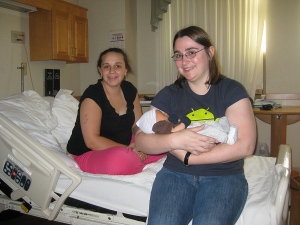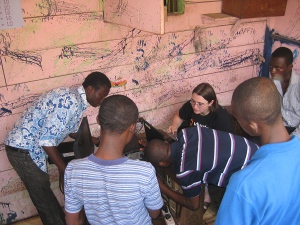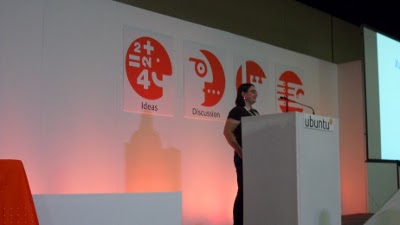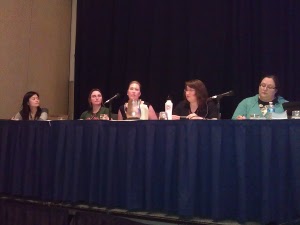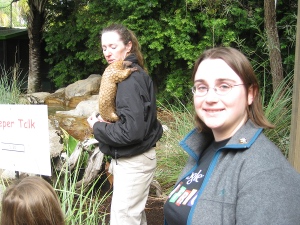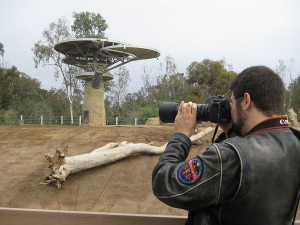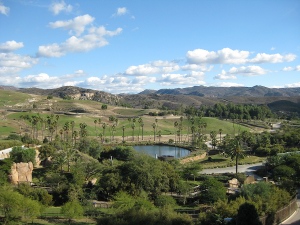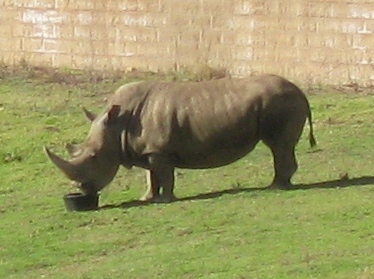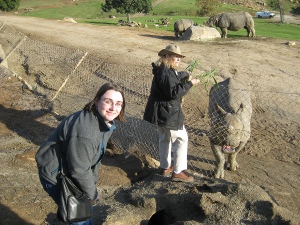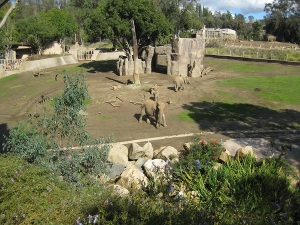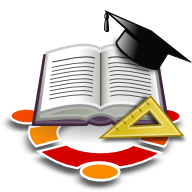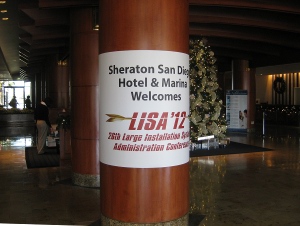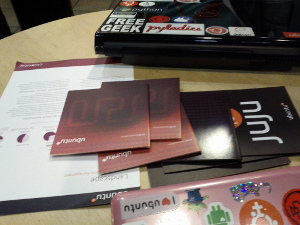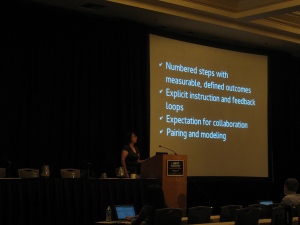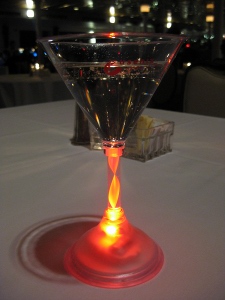I can count the number of times I’d been to the hospital emergency room that I can remember[0] on one hand: once for an asthma attack as a teenager, once for a seizure as a teenager, and once 8 and a half years ago when I slipped in the bathroom and needed 7 stitches in my forehead. Fortunately the “one hand” claim still stands, but until this Thursday I also managed to never actually have been admitted for any of my jolly ER trips. I was always medicated, scanned or stitched and sent on my way relatively quickly.
Wednesday night MJ and I ordered delivery Indian food, a typical prawn tikka masala for me and some lamb and a chicken tikka masala for him, from a place we frequently order from. MJ’s tikka masala dinner smelled a bit funny and he skipped eating it, I didn’t find the same to be true with mine and went ahead and ate it. Around 11:30PM I went to bed with indigestion, but this isn’t an uncommon occurrence following an Indian dinner, I took some antacid and didn’t think much of it.
Around 2AM I woke up with a violently upset stomach, during which I told MJ how wise he was to have skipped the tikka. The rest of the night was pretty much spent between the couch and the bathroom as my body used every mechanism possible to move all the insides of my body to the outside. By 6:30AM I woke MJ up (honestly, this ordeal wasn’t conducive to him sleeping well anyway) when a couple even less appropriate-for-polite-company symptoms manifested and we called the nurse line provided by the insurance company to get another opinion about what to do. With her outside opinion we were off to the UCSF hospital emergency room.
We were quite fortunate that 8AM on a Thursday isn’t a busy time for this emergency room and, following a trip to their rest room, we were put into an ER exam room immediately after a check of my vitals. Thankfully upon learning of my symptoms they gave me a room right next to the rest room. I was examined and by 9AM, after some vein hunting, I had started my first liter of IV fluids and my exciting day of vitals checking and all kinds of body fluid samples. The plan was to give me a couple bags of IV fluids and send me home before noon and I was very happy with this arrangement, after all, it was just a nasty stomach bug!
By 1PM they had me on my 4th and 5th bags simultaneously of IV fluids and aside from the vomiting (controlled by medication) my other symptoms continued throughout the day. The presiding doctor on the floor was quite surprised with just how dehydrated I had managed to get, but was confident that my blood levels and heart rate would normalize once I finished the fifth liter of fluids. He was wrong. My pulse stayed remained around 118 BPM and they didn’t want to send me home until I was at least below 100. The next attempt was to give me an anti-anxiety medication in case in the increased heart rate was partially due to stress of being in a hospital (I certainly wasn’t thrilled about being there). That didn’t work. I then got my first EKG to make sure my heart wasn’t doing anything else weird along with beating fast, fortunately it was fine.
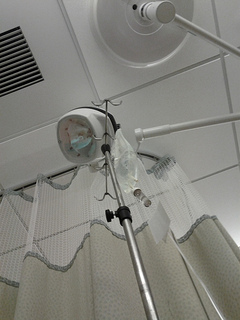 One of my IV bags while in the ER
One of my IV bags while in the ERAt this point it was early evening and they made the decision to admit me. Even with everything that had happened I was quite surprised with this turn of events, they only admit really sick people! The concern was that the continued bad vitals pointed to a more serious infection so they wanted to keep an eye (and IV, needles, blood pressure monitor, thermometer…) on me. It took well over an hour to get all the paperwork completed and round up the admitting doctors to review my case and finally get a room assigned. Thankfully MJ was diligent about making sure I got my own room (in spite of doubling me up at first, on the floor they put me on single rooms were the rule, not the exception, and given my condition having my own toilet was high on my priority list). MJ also did a supply run home to pick up some things for me over night.
I didn’t have a fun night. In addition to the stomach symptoms, the headache that I nursed all day had turned skull-splitting and all they could give me for it was Tylenol (I was on other pain medication for the stomach pain, but that did nothing against the headache) and they woke me up at least hourly for blood samples, swapping of IVs or to check my vitals. Thankfully since I had my own room they were able to bring in a chair that folded out flat where MJ was able to sleep to spend the whole night with me.
By the time morning rolled around I was able to keep some basic foods from my liquid and mush breakfast down. Unfortunately my headache remained, I was quite sore overall and I had what I later learned to be pretty common shallow breathing induced chest pain that people get from hospital stays. My pulse had slowly dropped over the night and blood pressure risen to levels they were happier with. At 104 BPM and confidence that the problem was bacterial food poisoning rather than a more serious infection both the nurse and doctors asked me several times if I felt I’d be ok to go home that morning, to which I replied emphatically each time: “YES!” with MJ there to be a voice of caution and to ask the important questions that my sick and “I want to go home!” brain was too addled to ask. They took me off the IVs and watched my continued coping with breakfast before finally starting the discharge process, which took about 2 hours. By noon I had my freedom back!
I wish I could say I was on the mend the rest of Friday, but in reality coming home wasn’t all that spectacular. On the way home from the hospital I was able to go to the grocery store and pharmacy with MJ to pick up supplies, but not long after actually returning home I felt considerably worse, off the IV fluids and desperately missing the effective pain medication the hospital had been administering for my continued stomach cramps. I pretty much spent the rest of the day curled in bed or on the couch working hard to drink water and Gatorade every moment I remembered, drifting in and out of sleep.
Saturday the head-splitting headache continued to haunt me, but by then I was able to take my headache medicine which at least made life worth living again. Unfortunately I also began feeling nauseated again and so my liquid and mush diet continued with the aid of an anti-nausea prescription from the hospital (which I almost declined since I had been feeling ok at the hospital!). I spent pretty much all day Saturday napping (I do love naps) and watching television for hours, which for anyone who knows me is a shocking rarity (not that I don’t watch TV, but it’s usually not something I “do” as an activity unto itself for long periods, it’s part of a greater multi-tasking agenda). By Saturday evening I was certainly still sick, but heading in the right direction. The urge to get back to emails and projects was steadily increasing and I did succumb to a little bit of “checking in” on things, even if it was just to do the minimum possible to grease the wheels on a couple priorities and let some people know I was out for a few more days. I had my first solid food beyond Saltines early Saturday evening, the most basic sandwich of a little turkey, mayonaise and cheese on bread (ok, I really could have skipped the cheese, but it wasn’t much and I was feeling adventurous).
It’s now Sunday. I haven’t taken any headache medication since last night and my headache appears to have gone away, hooray! Unfortunately I work up feeling nauseated again so it was back to the anti-nausea prescription. Looks like another day of mild diet and rest. I made an appointment for Thursday with my GP to follow up and make sure all is well for our trip to Philadelphia on Saturday. I’m hopeful that by next Sunday I’ll be back to my old self again and ready to do the food tasting for our wedding!
Obviously this is not an experience I want to ever repeat, but I think it was probably pretty decent as hospital visits go. Aside from typical “it’s hard to get attention when I need it” hospital complaints, the staff was largely friendly and accommodating, the facility and rooms felt clean and safe and I believe I got the treatment I needed in a reasonably efficient manner.
Very much looking forward to feeling better.
[0] I was born in a hospital and went a few times as a baby for fever-induced seizures, but I don’t know the details






